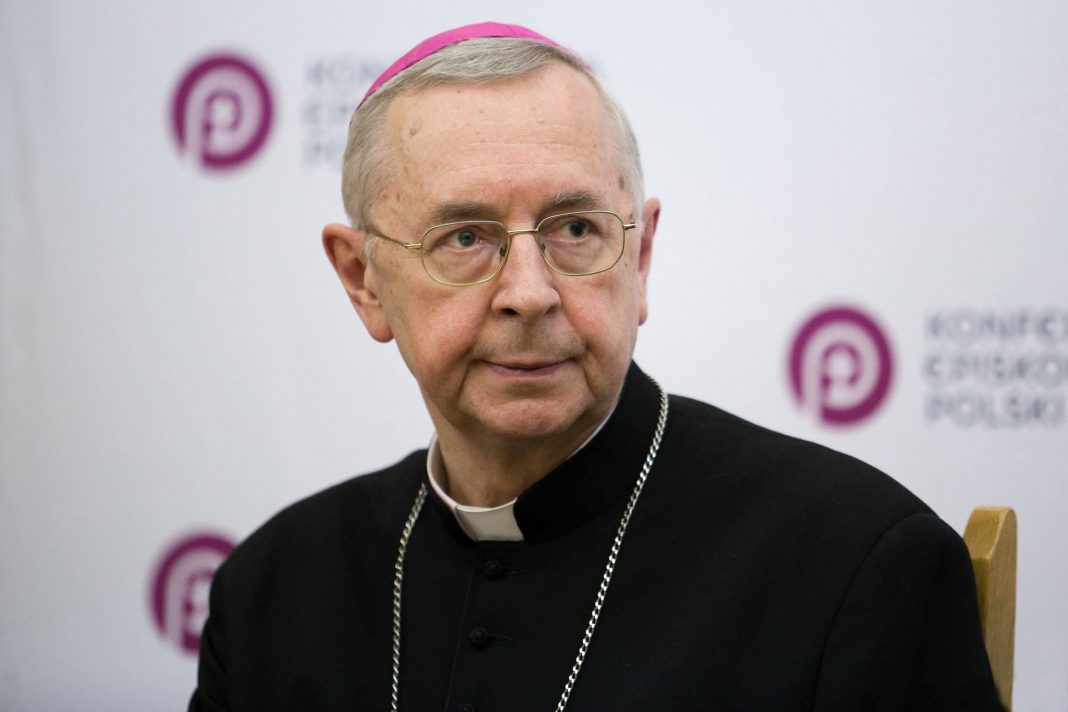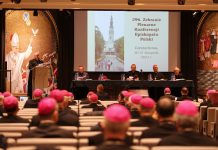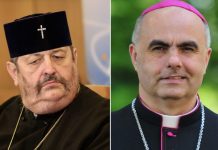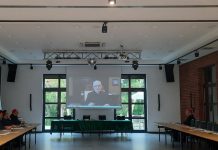“Bearing in mind this communion of faith and history between Poland and Germany, I would like to express my deep concern and anxiety with regard to the information that has been recently received from some spheres of the Catholic Church in Germany,” wrote the President of the Polish Bishops’ Conference, Archbishop Stanislaw Gądecki, in a letter addressed to the President of the German Bishops’ Conference, Bishop Georg Bätzing, regarding the German “synodal path”.
The Episcopate’s President acknowledged that the Catholic Church in Germany is important in Europe. “I look with unease at the actions of the German “synodal path” so far. Observing its fruits, one can get the impression that the Gospel is not always the basis for reflection,” he wrote.
Archbishop Gądecki stressed that, faithful to the teaching of the Church, “we should not yield to the pressures of the world or to the patterns of the dominant culture, since this can lead to moral and spiritual corruption.” “Let us avoid the repetition of worn-out slogans, and standard demands such as the abolition of celibacy, the priesthood of women, communion for the divorced, and the blessing of same-sex unions,” he appealed.
“Despite the outcry, ostracism and unpopularity, the Catholic Church—faithful to the truth of the Gospel and at the same time motivated by love for every human being—cannot remain silent and condone this false vision of man, much less bless or promote it,” the Episcopate’s President noted.
He added that the contemporary crisis of the Church in Europe is above all a crisis of faith. “The crisis of faith is one of the reasons why the Church experiences difficulties when it comes to proclaiming clear theological and moral doctrine,” he wrote. “The authority of the pope and bishops is most needed when the Church is going through a challenging time and when she is under pressure to depart from Jesus’ teachings,” the Episcopate’s President noted.
In this letter, Archbishop Gądecki refers to the documents of the Catholic Church, the teachings of Pope Francis, St. John Paul II, St. Paul VI, and the Congregation for the Doctrine of the Faith.
Press Office of the Polish Bishops’ Conference
We are publishing the full text of the letter:
Dear Bishop Georg,
The Catholic Church in Germany and in Poland are united by more than a thousand years of common history. She grows out of the deposit of the apostolic faith in Jesus Christ, which, placed in the hands of St. Peter, was passed on to the successors of the apostles—the bishops—who lead, teach, and sanctify the individual local Churches. “And so, I say to you, you are Peter, and upon this rock I will build my church, and the gates of the netherworld shall not prevail against it. I will give you the keys to the kingdom of heaven. Whatever you bind on earth shall be bound in heaven; and whatever you loose on earth shall be loosed in heaven” (Mt 16:18-19).
This communion of faith is clearly expressed in the figures of saints who are venerated by both Polish and German Catholics. I have in mind St. Bruno of Querfurt, St. Hedwig of Silesia, St. Teresa Benedicta of the Cross (Edith Stein), and St. Maximilian Maria Kolbe. Of particular importance in our relations is also the exchange of letters concerning forgiveness that mark the beginning of an important and much needed process of reconciliation, after the difficult experiences of World War II. Both Karol Wojtyla and Blessed Stefan Cardinal Wyszyński supported it. In later years, it found its concrete expression in the spiritual and material support that we received from German Catholics during the communist period in our homeland.
For all these reasons the Catholic Church in Germany is very close and very important to me. Bearing in mind this communion of faith and history between Poland and Germany, I would like to express my deep concern and anxiety regarding the information that has been recently received from some spheres of the Catholic Church in Germany. In a spirit of Christian charity, therefore, I take the liberty of addressing to you—as President of the German Bishops’ Conference—this letter, full of fraternal care and in a spirit of shared responsibility for the deposit of the holy apostolic faith entrusted to us by Christ.
As shepherds of the Church, we are aware that a spiritual battle is being waged in the world. “For our struggle is not with flesh and blood but with the principalities, with the powers, with the world rulers of this present darkness, with the evil spirits in the heavens” (Eph 6:12). Christ won the victory over Satan, and it is the Church’s responsibility to make that victory a reality in the world. Allow me, dear brother in the episcopate, to share my anxiety about the validity of the claims made by some circles in the Catholic Church in Germany, especially in the context of the “synodal path.”
The Temptation to Seek the Fullness of the Truth outside the Gospel
The Catholic Church in Germany is important on the map of Europe, and I am aware that it will either radiate its faith or its unbelief onto the entire continent. Therefore, I look with unease at the actions of the German “synodal path” so far. Observing its fruits, one can get the impression that the Gospel is not always the basis for reflection. This has happened throughout history. Just think of the so-called Jefferson Bible (T. Jefferson, The Life and Morals of Jesus of Nazareth, Rough Draft Printing, 2015). The American president firmly stated that the Gospels contain sentences that are extremely wise and lofty, which certainly come directly from Jesus, but also sentences that are foolish and trivial, which must come from uneducated apostles. Convinced that he had the criteria to distinguish one sentence from another, he decided to do it with scissors. In this way, a modern apocrypha was composed which, according to its author, is better than the original. It cannot be excluded out that the proprium christianum—what is characteristic for Christianity—is expressed precisely in these most difficult fragments of the Bible that fall under “Jefferson’s scissors.”
The Temptation to Believe in the Infallibility of Social Science
One of the temptations in the Church today is to constantly compare Jesus’ teaching with the current developments in psychology and the social sciences. If something in the Gospel does not agree with the current state of knowledge in these sciences, the disciples, wanting to save the Master from being compromised in the eyes of his contemporaries, try to “update” the Gospel. The temptation to “modernize” concerns in a particular way the sphere of sexual identity. It is forgotten, however, that the state of scientific knowledge changes frequently and sometimes dramatically, e.g., due to paradigm shifts. Changeability is inherent in the very nature of science, which has only a fragment of all possible knowledge. Discovering errors and analyzing them is the driving force of progress in science.
However, some scientific errors have had dramatic consequences. Just think of scientific theories such as racism and eugenics. Based on the most recent scientific advances, the U.S. Congress passed the National Origin Act in 1924, imposing restrictive migration quotas on people from Southern and Central Europe and banning almost entirely Asian immigration. The main reason was the belief that peoples such as Italians and Poles, for example, were racially inferior. On the other hand, based on knowledge of eugenics, an estimated 70,000 women belonging to ethnic minorities were forcibly sterilized in the United States in the 20th century (cf. G. Consolmagno, “Covid, fede e fallibilità della scienza,” La Civiltà Cattolica 4118, pp. 105-119). In this case and in others, we speak of so-called “scientific errors.” Alongside these, however, there are also “ideological fallacies.” These underlie, for example, the change in attitudes toward sexuality that is now being observed (J. A. Reisman, E. W. Eichel, Kinsey, Sex and Fraud: The Indoctrination of a People, Huntington House Publication, Lafayette 1990; J. Colapinto, As Nature Made Him. The Boy Who Was Raised as a Girl, Harper Perennial, New York-London-Toronto-Sydney 2006).
The process of knowledge development does not stop with our generation. The generations that will come after us will also have to put aside books on, for example, psychology or the social sciences, which today are considered infallible. How, then, should the Church respond to the current state of scientific knowledge so as not to repeat the mistake it made with Galileo? This is a serious intellectual challenge that we must take up, drawing on Revelation and the solid achievements of science.
The Temptation of Living with an Inferiority Complex
I am aware that Catholics—not only in Germany but also in Poland—are currently living under the pressure of public opinion, which causes many of them to suffer from a kind of inferiority complex. The disciples of Christ in general, Pope Francis wrote, are today threatened by “a sort of inferiority complex which leads them to relativize or conceal their Christian identity and convictions. (…) They end up stifling the joy of mission with a kind of obsession about being like everyone else and possessing what everyone else possesses” (Evangelii gaudium, 79).
Pope Francis, in an address to the staff of the Roman Curia, emphasized that today in Europe we no longer live in a “Christian system” (Francis, Christmas Greetings to the Roman Curia, 21 Dec. 2019). The world has become more pluralistic in many ways. An important source of this change in the Old Continent is “a profound crisis of faith that has affected many people.” Faith “is no longer an evident presupposition of social life; indeed, faith is often rejected, derided, marginalized and ridiculed.” Sadly, “the god of this world has blinded the minds of many” (2 Cor 4:4). They cannot bear sound doctrine but multiply teachers according to their own desires (cf. 2 Tim 4:3). Hence the validity of the warning to the Romans: “Do not conform yourselves to this age but be transformed by the renewal of your mind, that you may discern what is the will of God, what is good and pleasing and perfect” (Rom 12:2).
Faithful to the Church’s teaching, we should not yield to the pressures of the world or to the patterns of the dominant culture since this can lead to moral and spiritual corruption. Let us avoid the repetition of worn-out slogans, and standard demands such as the abolition of celibacy, the priesthood of women, communion for the divorced, and the blessing of same-sex unions. The “updating” of the definition of marriage in the EU Charter of Fundamental Rights is no reason to tamper with the Gospel.
The Temptation of Corporate Thinking
I am aware that the Church in Germany is steadily losing its faithful and the number of priests is decreasing year by year. She is, therefore, looking for ways to keep the faithful with her and to encourage young people to choose the priesthood. However, in doing so, it seems to be facing the risk of corporate thinking: “there are not enough employees, so let’s lower the recruitment criteria.” Hence the demand to abolish the obligation of priestly celibacy was included in the text “Commitment to Celibacy in Priestly Ministry,” which was given its first reading at the assembly of the “synodal path” in Frankfurt am Main on February 4th. The answer to the question of the relationship between the requirement of priestly celibacy and the number of vocations was already given by St. Paul VI: “We are not easily led to believe that the abolition of ecclesiastical celibacy would considerably increase the number of priestly vocations: the contemporary experience of those Churches and ecclesial communities which allow their ministers to marry seems to prove the contrary” (Sacerdotalis celibatus, 49).
The causes of the crisis lie elsewhere. We clergy have often become little more than experts on social, migration, and environmental policies, which certainly does not require a life of celibacy. Yet, Christ—as Pope Francis points out—does not need clerics obsessively preoccupied with their free time and feeling “an overbearing need to guard their personal freedom, as though the task of evangelization was a dangerous poison rather than a joyful response to God’s love which summons us to mission” (Evangelii gaudium, 81). The faithful deserve priests who put themselves fully at Christ’s disposal. Christ calls disciples “to be with him” (Mk 3:14). What attracts people to the Church and to the priesthood is not another offer of an easy life, but the example of a life totally consecrated to God.
In this context, the German “synodal path” also took up the question of the ordination of women by voting on the text “Women in ministries and offices in the Church” in Frankfurt am Main on February 4th. St. John Paul II definitively settled this matter. “In order that all doubt may be removed regarding a matter of great importance, a matter which pertains to the Church’s divine constitution itself, in virtue of my ministry of confirming the brethren (cf. Lk 22:32) I declare that the Church has no authority whatsoever to confer priestly ordination on women and that this judgment is to be definitively held by all the Church’s faithful” (John Paul II, Ordinatio Sacerdotalis, 4).
This has been repeatedly recalled by Pope Francis “as far as women’s ordination is concerned, the Church has spoken and said: ‘No.’ John Paul II said it, but with a definitive formulation. That door is closed, but on this issue, I want to tell you something. I have said it, but I repeat it. Our Lady, Mary, was more important than the Apostles, than bishops, deacons, and priests. Women, in the Church, are more important than bishops and priests” (Francis, Press Conference during the return flight from Rio de Janeiro to Rome, 28.07.2013).
In the modern world, equality is often misunderstood and equated with uniformity. Every difference is treated as a sign of discrimination. Moreover, the priesthood is often misunderstood as a source of domination and an ecclesiastical career rather than humble service. John Paul II in his teaching on the sacrament of Holy Orders reserved for men, referred to the very will of Christ and Tradition, while pointing to the “complementarity of the sexes.” Women had a very important role in the life of Jesus; alongside James and John, we have Mary and Martha. They were the first witnesses of the Resurrection. Finally, we have the Blessed Virgin Mary, without whose consent the mystery of the Incarnation would not have taken place and from whom Jesus learned to be human. Although Christ violated the canons accepted in Jewish society regarding the relationship between men and women, as in his conversation with the Samaritan woman, he did not leave the slightest doubt that the priesthood was a vocation exclusively for men (cf. Mulieris dignitatem, 26; Ordinatio Sacerdotalis, 2). However, this has not prevented women from playing roles in the Church that are just as important, and at times perhaps more important, than those of men. The list of women saints who have significantly influenced the destiny of the Church is long. It includes St. Hildegarde of Bingen, St. Catherine of Siena, St. Hedwig, Queen of Poland, St. Teresa of Avila, and St. Faustina.
In addition, one of the four forums of the “synodal path” voted on a working document entitled “Living in Successful Relationships,” which endorses the erroneous and scandalous practice of blessing same-sex relationships and attempts to change Church teaching on the sin of homosexual acts.
The Catechism clearly distinguishes between homosexual inclinations and same-sex acts. It teaches respect for every human being regardless of his or her inclination, but unequivocally condemns same-sex acts as acts against nature (cf. Rom 1:24-27; 1 Cor 6:9-10).
Despite the outcry, ostracism and unpopularity, the Catholic Church—faithful to the truth of the Gospel and at the same time motivated by love for every human being—cannot remain silent and condone this false vision of man, much less bless or promote it.
The impermissibility of blessing same-sex couples was reiterated by the Congregation for the Doctrine of the Faith in a letter dated February 22, 2021: “Consequently, in order to conform with the nature of sacramentals, when a blessing is invoked on particular human relationships, in addition to the right intention of those who participate, it is necessary that what is blessed be objectively and positively ordered to receive and express grace, according to the designs of God inscribed in creation, and fully revealed by Christ the Lord. Therefore, only those realities which are in themselves ordered to serve those ends are congruent with the essence of the blessing imparted by the Church. For this reason, it is not licit to impart a blessing on relationships, or partnerships, even stable, that involve sexual activity outside of marriage (i.e., outside the indissoluble union of a man and a woman open in itself to the transmission of life), as is the case of the unions between persons of the same sex” (Congregation for the Doctrine of the Faith, Responsum to a dubium regarding the blessing of the unions of persons of the same sex).
The Temptation to Succumb to Pressure
The crisis of the Church in Europe today is primarily a crisis of faith. To talk about God, we must first talk to God who lives in the depths of our hearts, where we taste the truth (R. Sarah, Służyć prawdzie [Serving the Truth], Loretto Sisters’ Publishing House, Warsaw 2021, p. 148). The crisis of faith is one of the reasons why the Church experiences difficulties when it comes to proclaiming clear theological and moral doctrine.
The authority of the pope and bishops is most needed when the Church is going through a challenging time and when she is under pressure to depart from Jesus’ teachings. When she is experiencing dramas like those gone through by the Christians of Galatia. It is necessary to forcefully proclaim: “But there is no other Gospel: there are only some people who sow confusion among you and who would like to twist the Gospel of Christ” (Gal 1:7).
Paul VI, under pressure because of his position on contraception expressed in the encyclical Humanae vitae, wrote: “Should the moral law be lowered to the level of what people usually do, and so we reduce morality to the level of morals (which, by the way, tomorrow may be even worse than today, and where will we then arrive)? Or, on the contrary, is it necessary to maintain a high-level ideal, even if it is difficult to achieve, even if the ordinary person feels incapable of reaching it, or guilty? I think that together with all the sages, heroes, and saints, I would say: all the true friends of human nature and true human happiness (believers and non-believers), even if they protest and resist, will thank in their hearts the authority who will have enough light, strength, and confidence not to lower the ideal. Never did the prophets of Israel or the apostles of the Church agree to diminish the ideal, never did they soften the concept of perfection, never did they try to narrow the distance between the ideal and nature. They never narrowed the concept of sin—on the contrary” (Paul VI, in: J. Guitton, Dialogues with Paul VI, Poznań 1969, p. 296).
In a similar vein, Pope Francis wrote: “Since faith is one, it must be professed in all its purity and integrity. Precisely because all the articles of faith are interconnected, to deny one of them, even of those that seem least important, is tantamount to distorting the whole. Each period of history can find this or that point of faith easier or harder to accept: hence the need for vigilance in ensuring that the deposit of faith is passed on in its entirety (cf. 1 Tim 6:20) and that all aspects of the profession of faith are duly emphasized. Indeed, inasmuch as the unity of faith is the unity of the Church, to subtract something from the faith is to subtract something from the veracity of communion” (Lumen fidei, 48).
Dear Brother in the Episcopate,
Our attitude to the world cannot be negative in principle, for Christ came not to condemn the world but to save it (cf. Jn 12:47). God does not want the sinner to die, but to repent and live (cf. Ez 33:11). We have the task of finding effective ways to call people to conversion. This is also what God’s mercy is all about. Jesus, seeing the crowd, took pity on them, “for they were like sheep without a shepherd; and he began to teach them many things” (Mk 6:34). This sentence does not mean that there were no shepherds in Israel at that time, to whose care God’s sheepfold was entrusted. However, there was a serious risk that, if the leaders failed, the people of God, that is, belonging to God, would be scattered and many sheep would be lost or fall prey to predatory beasts.
I know—we talked about this during our meetings, including recently in Poznan—that you are deeply concerned about the fate of the sheepfold entrusted to you, and that you desire that none of the sheep should go astray; that each of the faithful entrusted to you may reach blessed eternal life with Christ. So let me conclude with the words, quoted at the beginning of St. Paul’s Letter to the Ephesians: “Finally, draw your strength from the Lord and from his mighty power. Put on the armor of God so that you may be able to stand firm against the tactics of the devil. For our struggle is not with flesh and blood but with the principalities, with the powers, with the world rulers of this present darkness, with the evil spirits in the heavens. Therefore, put on the armor of God, that you may be able to resist on the evil day and, having done everything, to hold your ground. So, stand fast with your loins girded in truth, clothed with righteousness as a breastplate, and your feet shod in readiness for the gospel of peace. In all circumstances, hold faith as a shield, to quench all the flaming arrows of the evil one. And take the helmet of salvation and the sword of the Spirit, which is the word of God. With all prayer and supplication, pray at every opportunity in the Spirit. To that end, be watchful with all perseverance and supplication for all the holy ones and also for me, that speech may be given me to open my mouth, to make known with boldness the mystery of the gospel for which I am an ambassador in chains, so that I may have the courage to speak as I must” (Eph 6:10-20).
With expressions of deep respect and fraternal greetings in Christ,
+ Stanisław Gądecki
Archbishop Metropolitan of Poznan
President of the Polish Bishops’ Conference
Warsaw, 22 February 2022
On the Feast of the Chair of Saint Peter

 Polski
Polski







